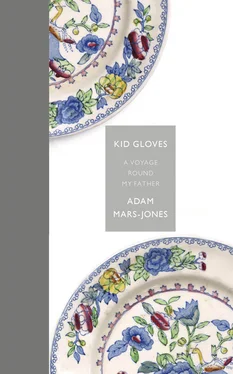Now of course those phone calls had an extra layer of meaning to them. The Anglesey house wasn’t big, and though there was an extension in the master bedroom I inhibited telephone intimacy whether I wanted to or not. Usually Dad spoke on the sitting-room phone, without seeking privacy. I imagine Mum had asked lightly, ‘How are you two getting on?’, for Dad to answer with an undertone of weary irony, as he did, ‘We’re having some very interesting discussions. He’s full of surprises.’
Over the days of wrangling I hoped that Dad would at some point acknowledge that in my own way I was standing up to him, something that dominant personalities are said to admire, though not all the evidence points that way.
Bisexual Fork. One day Dad’s rhetoric took a startling new tack. ‘You’re right, Adam,’ he said. ‘My generation was brought up with a very simple sense of these things. When I say I’m heterosexual, I only mean that all my past experience has been with women. There’s nothing to stop me from being attracted to a man tomorrow. Wouldn’t you agree?’
This was so different from his normal patterns of thought and speech that I was stupefied. Was the sly old thespian going to spring a coup de théâtre on me, revealing that he and his rather mousy clerk Mr Cant had been an item — lo, these many years! — that he hadn’t known how to tell me and was relieved to have someone to confide in at last?
Not quite. I hesitated.
‘Don’t you agree?’
There seemed no way out of it. ‘I suppose so …’
‘And by the same token, when you say you are homosexual, all you mean is that your experience to date has been homosexual.’ He pronounced the word, as was the way with his generation, with a long first syllable — even with the sounds we produced we showed we were talking about different things. ‘And just as I could have desires for a man, there’s nothing to stop you having desires for a woman tomorrow, isn’t that so?’ And we were back in Prince Charles territory, contemplating his experiments in self-cure by rutting.
The Bisset Surprise followed directly on the Bisexual Fork. Dad told me that he knew for a fact that I responded sexually to women. His evidence for this was that when we had been watching a Truffaut film in the cinema, Day for Night , I had played with myself whenever Jacqueline Bisset was on the screen.
I remembered that evening, which must have been in 1972. I had seen the film already and loved it, and thought it had more than enough charm and humour to qualify as a good choice for a family outing to the cinema. The evening was not a success, I understood that. Dad was seething in some way, though it took a lot of questioning to bring his objections to light. It turned out he had thought the film obscene. Obscene? If anything I thought it was a bit timid, a bit safe. Where was the obscenity? In a gesture made by one of the actresses, looking down at her actor boyfriend as he went off to the studio in the morning. He blew her a kiss, and she made a gesture of crossing her hands demurely below her waist, to signify ‘This is all yours. Yours and no-one else’s.’
This gesture, according to Dad, was of a corrosive and contaminating obscenity, tainting the whole film. He gave me to understand that I had subjected the party to a measurable dose of corruption by setting up our little visit to Studio One on Oxford Street.
Now, though, he was asking me to believe that I had laid aroused hands on myself during the film, and that he hadn’t made a comment at the time. Adam, old chap, we all get carried away when there’s a lovely lady on the screen — can’t fault your taste, my boy, she’s the most delightful creature — but next time be a bit more discreet, eh? You might give your mother a turn. An unthinkable scenario. Of course he wasn’t asking me to believe anything of the sort, he was asking himself to believe it. He was falling short of the standards of his profession, planting evidence in his own memory to substantiate something he needed to be true. He was tampering with the scene, as if he was one of those bent coppers he was known for hammering.
‘Dad … do you really think something like that could happen? With Mum sitting next to me and you saying nothing?’
Stiffly, troubled, he said, ‘That’s what I remember.’ Perhaps thinking he had revealed more of his own admiration for the sublime Bisset than was really necessary.
It made sense that the surprises shouldn’t only be on one side. I had another one myself that I was keeping in reserve, not knowing when would be the best time to disclose it. I was in a relationship. I realized that this would in itself be bad news from Dad’s point of view. Me being in a relationship would make it harder for him to maintain that I was going through some sort of phase. Naturally that was why I wanted him to know, so that he could stop clinging to invented doubts and accept my life as it was — as it was and as it was going to be. At the same time, it seemed obvious that any partner of mine would come in for an extreme intensity of scrutiny, exceeding anything that would be appropriate for high-level military security or access to international secrets. No character, however exemplary, would wring from my father an assent that would cost him so much. In fact anything that made my lover seem likeable, decent, solid, automatically became suspect and intolerable for that very reason. Under the eyes of such a judging committee, Prince Charles himself might have struggled to score a clear round.
His name was Mike Larson, an American student of architecture attached to (Gonville and) Caius College, though like every other student he had quickly learned to use the short form of its name and to pronounce it Keys . In those days, lacking clairvoyance, my friends and I would sit around in earnest shock discussing the oppressive madness of the American educational system, thanks to which Mike would finish his education thirty thousand dollars in debt. My generation had inherited a fear of debt from the previous one, though the arrival of credit cards in a few years’ time would sweep it away.
Mike was unhysterical about his financial future. If a great architect like Louis Kahn could die deeply in debt, who was he to be solvent?
Mike was in his early thirties, nearly ten years older than me, and had a background both provincial and cosmopolitan. His home town was Watsonville, California, which I seem to remember him describing as the artichoke capital of America, but this was either a pious fib or else a title that has since been snatched by Castroville. He had joined the Marines at eighteen and fought in Vietnam, though this was relatively early in the war. The film shown on board ship the night before his platoon landed was Dr Strangelove . The crew, who wouldn’t be going ashore, laughed less anxiously than the Marines, who would. His experience of combat was strongly charged with emotion. Love was part of that experience, though never described as such by the parties involved. Someone important to him was turned into a red mist under mortar fire. I think the name was Dennis Kovacs. Away from Vietnam, Mike was baffled that his old buddies seemed to dissociate themselves so easily from that fellowship of fear and intimacy.
Afterwards he had studied at Harvard, where the climate was uncongenial to a native Californian and (as he said) ‘it snowed … on my body .’ I think it was at Harvard that he learned the word ‘charrette’, meaning a last-minute burst (usually involving sleepless nights) to finish a piece of work. The phrase derives from the École des Beaux Arts in Paris, where the charrette was a little wagon pulled through a classroom at the last minute to be filled with students’ submissions. Anyone who failed to get his work in the cart didn’t get marked, and plenty were working up to the last minute, virtually sitting in the cart to add the final touches.
Читать дальше












